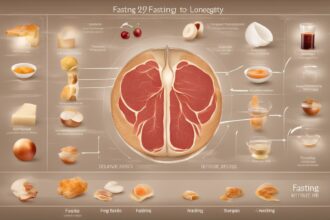Have you ever wondered if the secret to a longer, healthier life could be as simple as changing when—and how often—you eat? The concept of fasting longevity is gaining traction in the health and wellness world, and for good reason. Fasting, the practice of voluntarily abstaining from food for specific periods, isn’t just a trendy diet hack; it’s a powerful tool with deep roots in human history and promising scientific evidence supporting its role in extending lifespan and improving overall well-being. In this post, we’ll dive into how fasting can promote longevity, explore the science behind it, and share actionable tips to help you incorporate fasting into your lifestyle for a healthier, longer life.
What Is Fasting Longevity, and Why Does It Matter?
At its core, fasting longevity refers to the connection between fasting practices and an extended, healthier lifespan. Fasting isn’t a new concept—humans have fasted for religious, cultural, and survival reasons for centuries. But modern research is now uncovering how intermittent fasting, time-restricted eating, and other fasting methods can trigger biological processes that slow aging and protect against age-related diseases. From reducing inflammation to boosting cellular repair, fasting offers a natural way to enhance your body’s resilience. As we face rising rates of chronic illnesses like diabetes and heart disease, understanding how fasting can support long-term health is more important than ever.
The Science Behind Fasting and Longevity
Let’s get into the nitty-gritty: how does fasting actually help you live longer? The answer lies in a few key mechanisms that fasting activates at a cellular level. One of the most well-studied processes is autophagy, a cellular “clean-up” system where your body recycles damaged cells and proteins. Research shows that fasting triggers autophagy, which may help prevent neurodegenerative diseases and other age-related conditions. Additionally, fasting reduces oxidative stress and inflammation—two major drivers of aging. Studies, such as those published in journals like Cell Metabolism, have also linked fasting to improved insulin sensitivity and lower risks of chronic diseases, further supporting the idea of fasting for longevity.
Another fascinating area of research involves sirtuins, proteins often called “longevity genes.” Fasting has been shown to activate sirtuins, which play a role in DNA repair and metabolism regulation. While human studies are still evolving, animal research—particularly on mice and worms—demonstrates that caloric restriction and fasting can extend lifespan significantly. Though we’re not mice, these findings provide a compelling foundation for exploring how fasting health benefits translate to humans.
Types of Fasting for Longevity
Not all fasting is created equal, and different approaches can suit different lifestyles and goals. Here are some popular fasting methods that align with the goal of fasting longevity:
- Intermittent Fasting (IF): This involves cycling between eating and fasting periods, such as the 16:8 method (16 hours fasting, 8 hours eating). It’s beginner-friendly and widely studied for metabolic health.
- Time-Restricted Eating (TRE): A subset of IF, TRE limits your daily eating window to 6–10 hours, aligning meals with your body’s circadian rhythm to optimize energy and repair.
- 5:2 Diet: On this plan, you eat normally for five days a week and restrict calories to 500–600 on two non-consecutive days, mimicking the effects of fasting.
- Prolonged Fasting: Lasting 48 hours or more, this is typically done under medical supervision and may offer deeper cellular benefits like enhanced autophagy.
Choosing the right fasting method depends on your health status, schedule, and comfort level. Always consult a healthcare provider before starting, especially if you have underlying conditions.
Practical Benefits of Fasting for Longevity
Beyond the cellular magic, fasting offers tangible benefits that can improve your quality of life as you age. For starters, fasting can support healthy aging by maintaining a healthy weight and reducing the risk of obesity-related diseases. It also promotes better brain health—some studies suggest that fasting increases the production of brain-derived neurotrophic factor (BDNF), a protein linked to memory and learning. Plus, fasting often leads to improved energy levels and mental clarity, helping you stay active and engaged well into your later years. When combined with a nutrient-dense diet, fasting benefits for aging can be a game-changer for both body and mind.
How to Start Fasting for Longevity: Tips for Success
Ready to give fasting a try? While the idea of skipping meals might sound daunting, it’s easier than you think with the right approach. The key is to start slow and listen to your body. Here are some practical tips to help you embrace fasting longevity without feeling overwhelmed:
- Begin with a Simple Schedule: If you’re new to fasting, try a 12:12 schedule (12 hours fasting, 12 hours eating) before progressing to 16:8 or other methods.
- Stay Hydrated: Drink plenty of water during fasting periods to avoid dehydration and curb hunger pangs—herbal teas and black coffee are also okay for most plans.
- Eat Nutrient-Rich Foods: When you do eat, focus on whole foods like vegetables, lean proteins, and healthy fats to maximize the fasting health benefits.
- Avoid Overeating: Breaking a fast with a giant meal can undo some benefits; start with small, balanced portions to ease your body back into eating.
- Be Patient: It takes time for your body to adjust to fasting, so don’t stress if you feel hungry or tired at first—consistency is key.
Remember, fasting isn’t about starvation; it’s about giving your body a break to heal and reset. Pairing fasting with other longevity practices like regular exercise and stress management can amplify the results.
Potential Risks and Considerations
While fasting offers impressive benefits, it’s not a one-size-fits-all solution. Certain groups—such as pregnant women, individuals with eating disorders, or those with specific medical conditions—should avoid fasting or seek professional guidance. Even for healthy individuals, overdoing it with prolonged fasts or ignoring hunger cues can lead to fatigue, nutrient deficiencies, or irritability. Balance is crucial when pursuing fasting for longevity. If you’re unsure whether fasting is right for you, a chat with a doctor or nutritionist can help you make an informed decision. The goal is sustainable health, not short-term deprivation.
In wrapping up, it’s clear that fasting longevity isn’t just a buzzword—it’s a science-backed strategy with the potential to transform how we age. From activating autophagy to reducing inflammation, fasting offers a natural, accessible way to support a longer, healthier life. Whether you’re drawn to intermittent fasting or a more structured approach like the 5:2 diet, the key is to start small, stay consistent, and prioritize nourishment during eating windows. As research continues to unfold, fasting could become a cornerstone of healthy aging for many of us. So, why not give it a try? Your future self might just thank you for taking this step toward a vibrant, long-lasting life. Share your thoughts or fasting experiences in the comments—I’d love to hear how this journey works for you!






